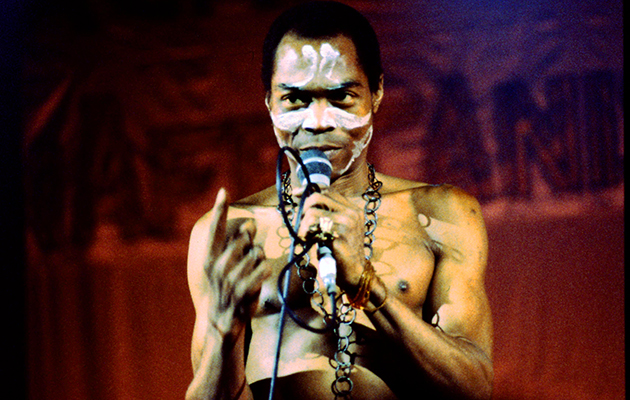Fela’s decline over the last few years of his life was a sad affair. He turned from politics to spiritual pursuits, to the concern of some who distrusted the influence of Professor Hindu. There were tales of trances and spirit visions within the Kuti compound. After Fela was jailed in early 1993, the fight seemed to go out of him. Even that didn’t stop the regime of General Abacha from threatening him with jail in April 1997 for his weed-smoking – though the sight of an emaciated Fela handcuffed in court brought a public outcry that led to his release. He died four months later from an AIDS-related illness, aged 58. His funeral cortege, leading to his resting place near the Kalakuta Republic, was lined with an estimated million mourners.
Today, the former outlaw is honoured, his old compound transformed into the Kalakuta Museum. But restoration of Fela’s recorded legacy is still ongoing. Many master tapes were lost in the 1977 raid; others vanished. The process has taken years, often requiring painstaking transfer from vinyl. “It was five minutes’ worth of music a day,” says Stein, who remains one of the guardians of Fela’s flame, along with his sons Femi and Seun, whose band features many of his father’s players. Asked for a memory of his father, Seun talks about “my father’s eccentricity” but chooses to remember him “in a Godlike state” at the end of his life. “He had been through so much,” he says. “He was a man of knowledge.”
“They beat him with rifle butts, they beat that guy so badly, but they never stopped him,” says Stein. “I admired his courage.”
_______________________
“No visa, no work permit! No shit!”
Fela and his band in the USA
In 1969, Fela and the Koola Lobitos embarked on an extensive tour of America. Whatever hopes they had for the tour evaporated quickly. The promoter hadn’t obtained the correct work permits for all the band. “No bread, no shit, nothing! Now we’re illegal immigrant motherfuckers,” Fela recalled later. The band drove across country, looking for shows, finally ending up in Los Angeles. Eventually, the band fell in with future Starsky & Hutch actor Bernie Hamilton – brother of jazz drummer Chico – who booked them at his club, Citadel de Haiti on Sunset Boulevard. Speaking to LA Weekly, Fela’s lover and mentor Sandra Izsadore remembers, “It was a great club, just no clientele, so [Bernie] hired Fela to come in, and he paid him under the table. In a little bit of no time, that club was packed… Hair was playing across the street. The cast would come over and hang out at Bernie’s place after they did their show. It was such a revolutionary time.” The Citadel shows attracted high-profile African-Americans like Melvin Van Peebles, Esther Phillips and Jim Brown. On one night off, Fela reportedly got into a fight with Frank Sinatra. Eventually, in debt and under threat of legal action, the band were forced to leave the US. “When he went back to Nigeria, he was a changed person,” remembers Izsadore.
_______________________
The Afrobeat Goes On
The choice cuts from Fela Kuti’s mighty catalogue
Koola Lobitos
’69 LA Sessions
Knitting Factory, 1993
Before and after Fela’s ‘Black Power” conversion in the US. The Lobitos’ jazzy highlife mutates into the psych-funk and proto-Afrobeat of the LA sessions.
7/10
Gentleman/Confusion
Knitting Factory, 1973/74
Afrobeat arrives on “Gentleman”, castigating Africans apeing western dress (“him go sweat/him go smell like shit”). “Confusion”, all swirls of electric piano and Tony Allen’s mighty drum patterns, is a futuristic suite over two vinyl sides.
9/10
Zombie
Knitting Factory, 1976
“Go and kill! Go and die!” Fela’s taunt at the dumb obedience of the Nigerian military became a massively popular street chant – but brought terrible vengeance from the army. It’s still a killer slice of Afrobeat.
9/10
Sorrow Tears And Blood/Opposite People
Knitting Factory, 1977
The slinky groove of “Sorrow” leads into one of Fela’s greatest protest songs, initially inspired by the 1976 Soweto uprising. “Opposite People” has the band cooking at their James Brown funkiest, and jazziest.
10/10
Teacher Don’t Teach Me Nonsense
Knitting Factory, 1986
Fela resisted outside producers (Bill Laswell delivered a stinker on Army Arrangement), but Benin’s Wally Badarou mixed spontaneity with an uncharacteristically clean sound. “Just Like That” stands out.
8/10
Underground System
Knitting Factory, 1992
Fela’s swansong was defiant to the last. The breakneck title track, a castigation of Africa’s corrupt elite, also manages elegance. “Confusion Break Bones” sounds weary, though, as if Fela, by now sick, was wondering, ‘How often must I say this?’
8/10
_______________________
When Macca Met Fela
Confrontations and robbery in Lagos
In 1973, Paul McCartney decided to make Band On The Run in Nigeria. A fan after being introduced to Fela’s music by Ginger Baker, McCartney discovered EMI had a studio in Lagos. Paul and Linda flew to Lagos with Wings guitarist Denny Laine and engineer Geoff Emerick. There, they found the city under martial law, and dilapidated studios with “half the equipment hanging off the wall”.
Worse was to come. The McCartneys were robbed at knifepoint, losing their cameras, jewellery and cassettes of work in progress. On the plus side, the McCartneys saw Fela play at The Afro-Spot – “The best band I’ve ever seen,” said McCartney – but even this turned sour when Fela denounced McCartney’s visit as an attempt to “steal the black man’s music” and showed up at the studio to confront him. An uneasy accommodation between the two stars was reached, and Macca’s plans to hire some of Fela’s musicians, without their boss’ permission, were dropped. Band On The Run duly emerged, and McCartney’s admiration for Afrobeat remained undiminished. “It’s incredible music down there,” he said. “I think it will come to the fore.”
Subscribe to Uncut and make huge savings on the cover price – find out by clicking here!


